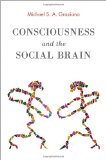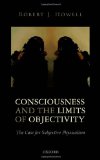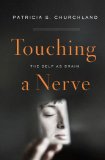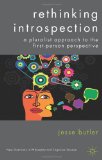September 2, 2013

Consciousness and the Social Brain by Michael S.A. Graziano (Oxford University Press, 2013)
(kindle ed.), (amazon.co.uk)
Book description from the publisher:
What is consciousness and how can a brain, a mere collection of neurons, create it? In Consciousness and the Social Brain, Princeton neuroscientist Michael Graziano lays out an audacious new theory to account for the deepest mystery of them all. The human brain has evolved a complex circuitry that allows it to be socially intelligent. This social machinery has only just begun to be studied in detail. One function of this circuitry is to attribute awareness to others: to compute that person Y is aware of thing X. In Graziano’s theory, the machinery that attributes awareness to others also attributes it to oneself. Damage that machinery and you disrupt your own awareness. Graziano discusses the science, the evidence, the philosophy, and the surprising implications of this new theory.
Google Books preview:
See also: Author’s academic website, video lecture
Comments (0)
- consciousness,new books
July 10, 2013

Consciousness and the Limits of Objectivity: The Case for Subjective Physicalism by Robert J. Howell (Oxford University Press, USA, 2013)
(amazon.co.uk)
Book description from the publisher:
In Consciousness and the Limits of Objectivity Robert J. Howell argues that the options in the debates about consciousness and the mind-body problem are more limited than many philosophers have appreciated. Unless one takes a hard-line stance, which either denies the data provided by consciousness or makes a leap of faith about future discoveries, one must admit that no objective picture of our world can be complete. Howell argues, however, that this is consistent with physicalism, contrary to received wisdom. After developing a novel, neo-Cartesian notion of the physical, followed by a careful consideration of the three major anti-materialist arguments–Black’s ‘Presentation Problem’, Jackson’s Knowledge Argument, and Chalmers’ Conceivability Argument–Howell proposes a ‘subjective physicalism’ which gives the data of consciousness their due, while retaining the advantages of a monistic, physical ontology.
Google Books preview:
See also: Author’s website
Comments (0)
- consciousness,new books
June 28, 2013

Touching a Nerve: The Self as Brain by Patricia S. Churchland (W.W. Norton & Co., 2013)
(kindle ed.), (amazon.co.uk)
Book description from the publisher:
A trailblazing philosopher’s exploration of the latest brain science—and its ethical and practical implications.
What happens when we accept that everything we feel and think stems not from an immaterial spirit but from electrical and chemical activity in our brains? In this thought-provoking narrative—drawn from professional expertise as well as personal life experiences—trailblazing neurophilosopher Patricia S. Churchland grounds the philosophy of mind in the essential ingredients of biology. She reflects with humor on how she came to harmonize science and philosophy, the mind and the brain, abstract ideals and daily life. Offering lucid explanations of the neural workings that underlie identity, she reveals how the latest research into consciousness, memory, and free will can help us reexamine enduring philosophical, ethical, and spiritual questions: What shapes our personalities? How do we account for near-death experiences? How do we make decisions? And why do we feel empathy for others? Recent scientific discoveries also provide insights into a fascinating range of real-world dilemmas—for example, whether an adolescent can be held responsible for his actions and whether a patient in a coma can be considered a self.
Churchland appreciates that the brain-based understanding of the mind can unnerve even our greatest thinkers. At a conference she attended, a prominent philosopher cried out, “I hate the brain; I hate the brain!” But as Churchland shows, he need not feel this way. Accepting that our brains are the basis of who we are liberates us from the shackles of superstition. It allows us to take ourselves seriously as a product of evolved mechanisms, past experiences, and social influences. And it gives us hope that we can fix some grievous conditions, and when we cannot, we can at least understand them with compassion.
Google Books preview:
Comments (0)
- cognitive science,consciousness,new books,self
May 25, 2013

Rethinking Introspection: A Pluralist Approach to the First-Person Perspective (New Directions in Philosophy and Cognitive Science) by Jesse Butler (Palgrave Macmillan, 2013)
(kindle ed.), (amazon.co.uk)
Book description from the publisher:
We seem to have private privileged access to our own minds through introspection, but what exactly does this involve? Do we somehow literally perceive our own minds, as the common idea of a ‘mind’s eye’ suggests, or are there other processes at work in our ability to know our own minds? Rethinking Introspection offers a new pluralist framework for understanding the nature, scope, and limits of introspection. The book argues that, contrary to common misconceptions, introspection does not consist of a single mechanism but rather a diverse range of mental states and cognitive processes with a broad spectrum of epistemic properties. Building upon this revised conception of introspection, the book illustrates and analyzes the variety of ways in which we introspectively grasp the contents of our own minds, from the immediate phenomenal knowledge generated by conscious experience to the self-deceptive possibilities enabled by certain kinds of inner speech.
Comments (0)
- consciousness,new books,philosophy of mind






